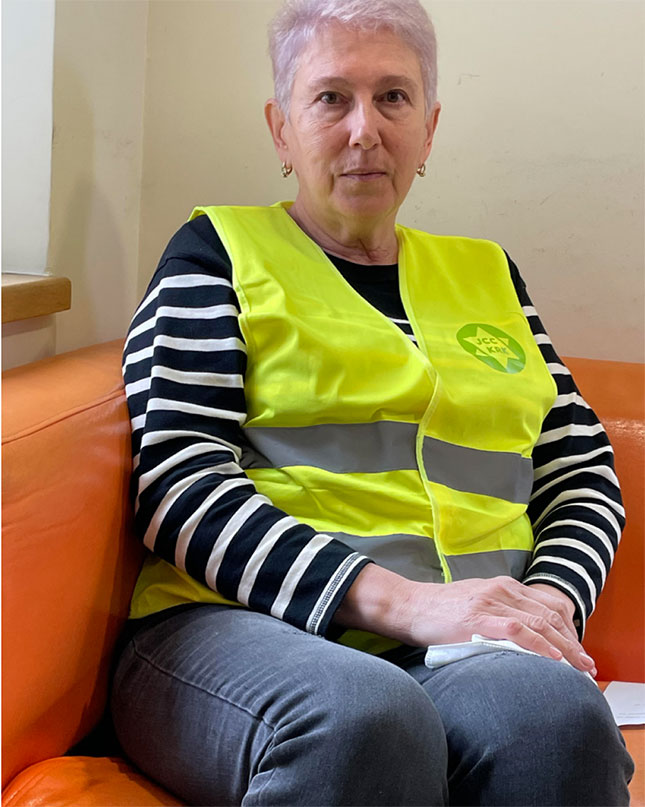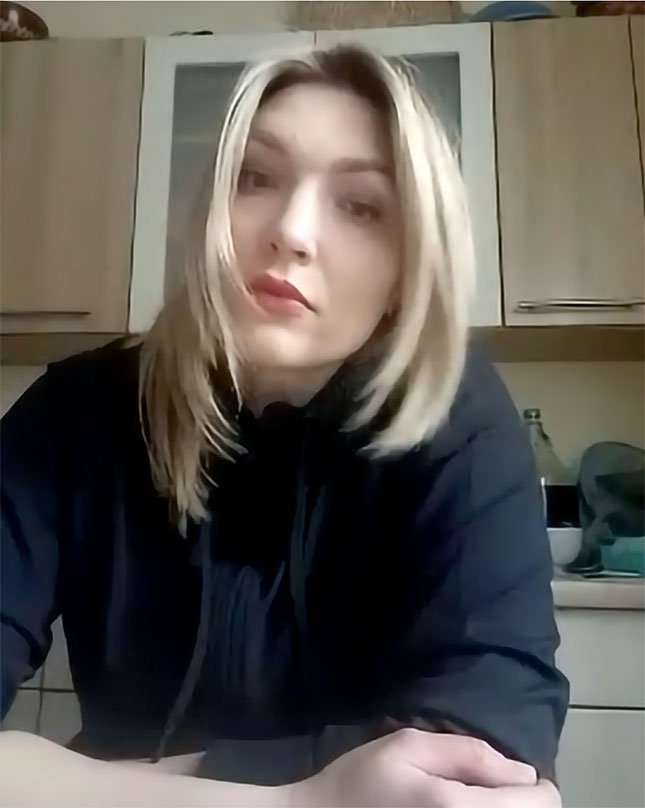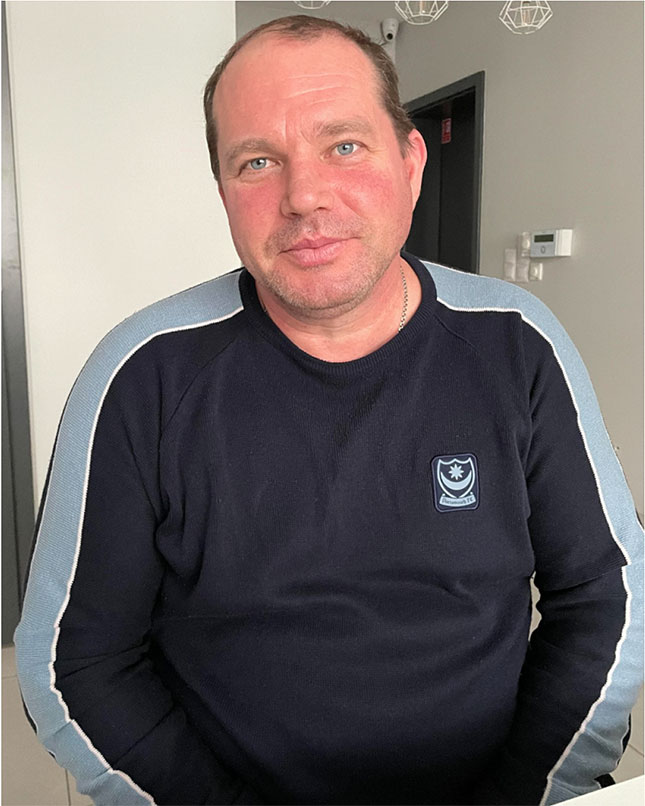Three weeks after the Russian invasion of Ukraine, I arrived in Poland intending to volunteer, maybe by ladling soup for refugees or by unpacking boxes of humanitarian aid. Instead, I began a series of interviews with refugees in Kraków, Poland’s second-largest city, located just a few hours from the Ukrainian border.
By the time I arrived, Poland felt, if not quite like a country at war, certainly a nation poised to support a war. The trains and train stations overflowed with evacuees, mostly women and children. Volunteers in dayglow vests manned help points in train stations, bus depots, airports, and shopping malls. Blue and yellow flags were everywhere. Even local shopkeepers were stepping up. One convenience store I visited had posted a sign on a shopping cart: “Please take an item from your bag to help feed our Ukrainian visitors.”
A welter of nonprofits had sprung up to provide humanitarian assistance—transport, food, shelter, medicine, and other essentials. Long lines of Ukrainians waited outside aid-distribution points in storefronts, church basements, empty supermarkets, and the region’s giant sports stadium, the Tauron Arena.
Meantime, a second stream of visitors, mostly from Europe and America, was arriving with supplies—overcoats, sweaters, blankets, toys, and diapers—for these nonprofits to pass on to those in need.
My destination, the Jewish Community Centre of Kraków, is a critical node in this helping network. Once devoted to rebuilding Jewish life in the shadow of the Holocaust, the JCC put those activities on hold when the war broke out and arranged services for Ukrainians, Jewish and non-Jewish. By the time I arrived, the center was serving 1,000 people a day.
I first had the idea of interviewing some of them as a way to help the JCC provide better services. But soon I began to wonder if the conversations’ true value might be for the Ukrainians themselves. People seemed to welcome a chance to tell their stories, to make sense of what they had been through and put it in perspective.
Some 45 adults participated in 35 interviews. The youngest were university students; the oldest, an 86-year-old Holocaust survivor. They came from every stratum of Ukrainian society: cleaners and skilled tradesmen but also accountants, entrepreneurs, several engineers, and a university professor. Some lived in places where the war was raging. Others had traveled from cities largely untouched by fighting. Every story was unique, telling of one individual’s painful journey. Together, they add up to a collective portrait of the Ukrainian refugee experience.
What made you decide to leave Ukraine? I asked them. How did you get to the border? Why Kraków? Who, if anyone, helped you get your bearings in the city? And perhaps the most challenging questions for many refugees: What lies ahead? Do you plan to return to Ukraine? Might you stay in Poland, or are you thinking of going further, deeper into Europe or beyond?
It wasn’t easy to listen to their stories. The pain and loss they had experienced sometimes seemed beyond comprehending. Many had given up their jobs. Others had seen their homes destroyed. A few had lost friends and family members. Almost all had left someone they loved behind in Ukraine—husbands, boyfriends, brothers, elderly parents, adult children. For everyone, there was the weight of the uncertain future.
Still, in the end, what came across most powerfully, for all this pain, was the refugees’ strength—their determination and resilience and the sacrifices they were willing to make for their country and their families and friends.
The parents who had spared nothing to bring their disabled children to safety, the engineers and other professionals willing to work as cooks and cleaners to feed their families, the children whose bravery and optimism helped sustain their frightened parents: these weren’t victims but fighters, no less brave than the fighters serving on the battlefield in the country they had left behind.
Viktoria’s daughter called early on the sixth day of the war. “We’re leaving now,” Viktoria, 65, recalls her saying. “We’ll pick you up in a few minutes.” But Viktoria and her husband, Viktor, had no intention of leaving Mykolaiv.
“We lived in Israel for a decade,” she explains. “We were used to shelling. And my husband didn’t want to leave his garden. He’d been nurturing his sweet potato seedlings all winter, and it would soon be time to put them in the ground.”

It would be seven weeks before the couple finally left Mykolaiv, one of the Ukrainian cities that endured the worst Russian punishment in the first months of the war. It was constantly shelled by frustrated troops unable to break through to Odessa.
At first, Viktoria thought that the Russians must be aiming for military targets. Then a friend sent a video of people lined up at a shopping mall who suddenly took cover as a shell exploded nearby. “They were targeting people at ATMs,” Viktoria recalls, still incredulous.
Viktoria’s apartment building had no basement, so at first, she and her husband took shelter in their windowless bathroom. Then someone explained that if a shell hit the building, porcelain and mirrors would shatter into a thousand deadly fragments; the bathroom was one of the worst places to hide. So instead, Viktor and Viktoria huddled in a corridor when the air-raid sirens sounded.
“You were always on alert,” Viktoria recalls, “listening for the whistle of a jet and looking at the sky. And your ears become very sensitive—mine would vibrate a little whenever a plane was approaching.”
In late March, Viktoria began to wonder if she should leave. She wanted to see her daughter and granddaughter, now in Kraków, and she finally persuaded her reluctant husband to make the trip.
But even in Poland, Viktoria couldn’t keep her mind off Mykolaiv, where things had gotten much worse since she left. The bombardments intensified in early April. Most of Viktoria’s friends and neighbors had fled. And she wasn’t sure if her apartment building was still standing—there was no one local left to ask.
What haunts her most is a news video she saw shortly after arriving in Poland. It shows a street in Mykolaiv not far from her apartment, a spot Viktoria knows well. In the video, corpses lie on the pavement, a pile of bodies covered by a sheet of black plastic.
“It’s just five minutes from my house,” Viktoria recalls, still struggling to come to grips with it. “There’s nothing strategic anywhere near it. Not even the Nazis were so focused on killing ordinary civilians.”
“Why would I leave a place I know and love and head out into nowhere?” Oksana remembers asking during the war’s first days. An engineer at a national research institute in the provincial city of Pavlohrad, she enjoyed all the perks of Ukraine’s privileged professional elite, raising her two children—a girl, nine, and a boy, 15—in comfort and security.
She still isn’t sure what changed her mind. Media stories warned about potential radiation leaks from the nuclear power plant 150 miles away. The constant rumble of military vehicles passing through the city began to rattle her, and her daughter was having stomach troubles that Oksana attributed to the war. Whatever the reason, once Oksana made her decision, it took her less than two hours to pack and get out the door.
She arrived at a railroad station teeming with women and children waiting to get on a train, any train, that would take them west, away from the war. Many had already waited a day or longer, and every departing train was surrounded by a swirling crowd desperate to board.

Oksana and her daughter managed to get into one train car, but her son was left out on the platform, and when Oksana went to find him, her daughter disappeared in the other direction, pulled into the train by the insistent mob. Only luck reunited the family after about ten minutes, with the mob pushing Oksana and her son back into the overcrowded train.
The trip to Lviv took 23 hours, mostly because the train kept backtracking to avoid Russian bombardment. The scariest moment came that night. The train stopped and passengers were told to get out. They stood in the dark in an open field listening to shells exploding nearby.
In Lviv, she and her children were met by another sea of surging women and children and boarded another overcrowded train, this one to the Polish border. And it was on this train that Oksana broke down.
“The weight of it finally hit me,” she says. “I’d been a successful professional with an important job. I had wonderful friends. My children were facing a bright future. Now I was homeless, with nothing, on a freezing train, heading to a place where I knew no one.”
An acquaintance knew someone in a village not far from Kraków willing to house Oksana and her children in exchange for a small government subsidy. Both the children enrolled in school. Oksana found a job stocking shelves at a local grocery store and set about building a new life.
“I’m doing what I need to do,” she said, “and I’m okay with it. Thousands of women like me were forced to leave Ukraine and now must find ways to feed their families. It’s not a problem for me. It’s the next step. We’ll see what comes later.”
Valery, 48, came home to his apartment in Bucha in the early morning hours of February 24, expecting a day off after three nights on call as an HVAC technician. Instead, he watched from his living room window as helicopters circled and bombs fell on the nearby airfield in Hostomel.

He considered his options, and none looked good. But one thing was clear: he had to evacuate his wife. Partially paralyzed and epileptic since suffering a stroke a few years earlier, she would not survive in an occupied city
Valery’s first instinct was to drive to his weekend cottage. But things were even worse there, closer to Belarus. Though he boarded up the windows, bombardments sent shards of glass into the house. A passing tank shot at his car, and when Valery went outside to investigate, a soldier shot at him. He knew he had to leave when an explosion blasted a hole in the roof, but he had no idea where he might find safety.
He and six others squeezed into someone’s car and drove for eight hours, often under heavy bombardment. Volunteers hosted Valery and his wife one night; other strangers offered food. At the Polish border, he abandoned his car and walked, pushing his wife’s wheelchair, and once they passed the checkpoints, they were surrounded by volunteers who put them on a bus to Kraków.
He did not know where to look for help in Poland, but the JCC found him—a volunteer noticed the handicapped woman sleeping on a cot in a big, crowded reception center. Valery jumped at the offer of a private hotel room. There was warm food and someone to call and, in a few days, an appointment with a doctor.
Nothing is easy. As a foreigner, Valery doesn’t know what he doesn’t know, and he struggles with little things, like topping up the data plan on his cell phone. His biggest need: if he had a caregiver for even a few hours daily, he could find a job as a technician and start paying his own way.
A calm, patient man with a philosophical bent, he is trying to make sense of what has happened to him since the invasion. But he sees no point in speculating about the future. “I don’t know what’s going to happen today or tomorrow or even this evening,” he says. “There’s nothing to do but keep going.”
Top Photo by Omar Marques/Getty Images
